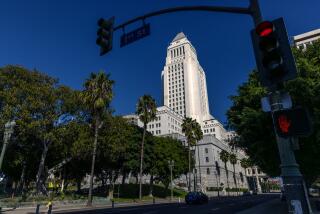State Task Force Urges Curbs on Camera Use in Courtroom
- Share via
SAN FRANCISCO — A state task force appointed after the O.J. Simpson verdicts will recommend today that cameras be banned from all criminal pretrial proceedings and from most trial sessions where a jury is not present.
The report, to be presented to the state Judicial Council today, also recommends a ban on broadcasting pictures of courtroom spectators and urges judges to consider a variety of conditions, including whether both sides in a case want cameras, before allowing electronic coverage of trials.
The council, which is the policymaking body for California courts, will vote on the proposal in May after the public has time to comment. Trial judges now have broad discretion to allow court proceedings to be televised.
California Chief Justice Malcolm Lucas, who heads the Judicial Council, appointed the task force to examine the issue after Gov. Pete Wilson and others called for a ban on cameras after the Simpson trial. The task force consists of nine judges, two court administrators, a public defender and a district attorney.
The proposed ban on pretrial proceedings would bar electronic coverage of arraignments, bail hearings, preliminary hearings, jury selection and pretrial motions in criminal cases.
Cameras also would be barred from criminal and civil trial proceedings in which a jury is not present, except for matters heard after a verdict. Spectators, including family members of the victims or defendants, could not be photographed. The proposed restrictions would affect radio and television broadcasts, and might include newspaper photography.
Karen Frederiksen, a Los Angeles lawyer representing news media before the council, called the recommendations a “serious and significant change . . . and wholly unnecessary.”
The proposal would “severely limit the rights of those in California and elsewhere to fully exercise their 1st Amendment rights of viewing trial proceedings in their entirety, including the important pretrial proceedings that take place,” she said.
The Judicial Council is expected to curtail cameras when it votes in May, but it may not accept all of the task force’s recommendations.
“It is still a working proposal,” said San Diego Court of Appeal Justice Richard D. Huffman, who headed the task force, earlier this week. “Our task force was to make the initial evaluation and recommendation, and it will be part of a long process of evaluation.”
Supreme Court Justice Ronald M. George, a council member, refused to comment.
“While the media are free to report that which occurs in public hearings,” said the proposal, which was obtained by The Times, “contemporaneous broadcast of all or significant parts of such preliminary matters adds little to the public’s knowledge of the case.”
The report said the benefits of electronic coverage are outweighed by potential harm. By prohibiting the filming of pretrial proceedings, “the risk that a juror will hear information that might improperly influence the outcome of the case will be negligible.”
The task force described as “legitimate” the concerns that broadcasting of court proceedings could spur attorneys to raise issues, bring motions or make arguments simply to influence public sentiment.
Airing pictures of spectators is “more in the nature of entertainment or drama,” the report said, and family members of those involved in a case should “not be subjected to such intrusions.”
The task force also approved several factors that it said judges must consider in ruling on a request for television coverage. These included the “importance” of maintaining public trust and confidence in the judicial system, whether coverage might unfairly distract or influence a jury, the difficulty of jury selection in the event of a mistrial, and the security and dignity of the court.
Language in the report suggests that the task force also urges that media cameras be barred from courthouse steps or hallways, but it was not clear how that would be enforced.
More to Read
Sign up for Essential California
The most important California stories and recommendations in your inbox every morning.
You may occasionally receive promotional content from the Los Angeles Times.














